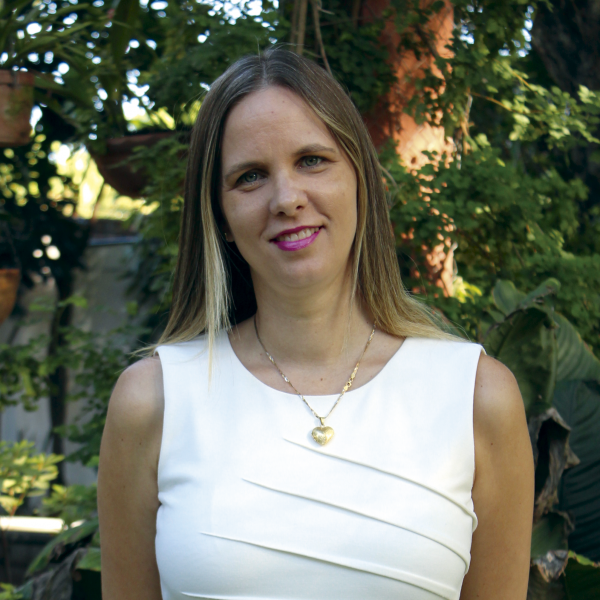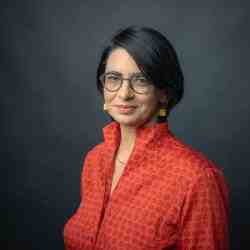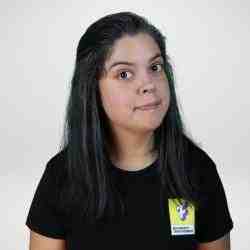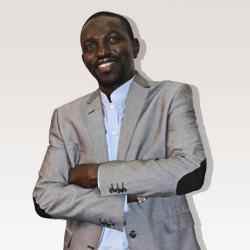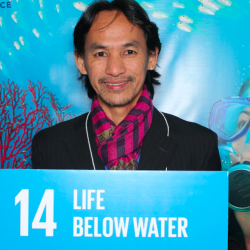Introduction
María is working in a sustained and responsible manner in the recognition, defense and realization of the fundamental rights and freedoms of the people with disabilities. Although their specific focus is on people with disabilities, their actions reach the population as a whole and are oriented towards making Paraguay a better place to live.
As President of the Saraki Foundation, María works by helping to detect social problems and providing real solutions. In this way, Saraki manages to work as a laboratory with the capacity to create, promote and spread ideas based on the inclusion, equality, and equity of people. These ideas arise in a cooperative way and different actors of society participate in its creation. The collaboration and articulated work in this creation is the key so that the implementation of the solutions can be sustainable in the time.
María implements an innovative vision when developing processes and actions so that people with disabilities have access to opportunities and resources, not only focusing on their needs but also their abilities. In this way, Saraki generates answers that help all people to develop and live freer, full, independent and productive lives. To reach maximum impact, Mary focuses on doing more and more with less. While most civil society organizations in Paraguay seek to grow in revenue, sustain their actions from within or grow in number of people rented within the staff, Saraki seeks to leave installed capacity in its beneficiaries and partner organizations.
The New Idea
María is working in a sustained and responsible manner in the recognition, defense and realization of the fundamental rights and freedoms of the people with disabilities. Although their specific focus is on people with disabilities, their actions reach the population as a whole and are oriented towards making Paraguay a better place to live.
As President of the Saraki Foundation, María works by helping to detect social problems and providing real solutions. In this way, Saraki manages to work as a laboratory with the capacity to create, promote and spread ideas based on the inclusion, equality, and equity of people. These ideas arise in a cooperative way and different actors of society participate in its creation. The collaboration and articulated work in this creation is the key so that the implementation of the solutions can be sustainable in the time.
María implements an innovative vision when developing processes and actions so that people with disabilities have access to opportunities and resources, not only focusing on their needs but also their abilities. In this way, Saraki generates answers that help all people to develop and live freer, full, independent and productive lives. To reach maximum impact, Mary focuses on doing more and more with less. While most civil society organizations in Paraguay seek to grow in revenue, sustain their actions from within or grow in number of people rented within the staff, Saraki seeks to leave installed capacity in its beneficiaries and partner organizations.
The Problem
According to World Bank studies, more than 15% of the population has a disability (physical or mental). In developing countries this number is even higher. According to private and civil society studies carried out in Paraguay, the number of people with disabilities amounts to 19%.
People with disabilities have been characteristically excluded from social systems. Associated with taboo cultures and deeply rooted myths, people with disabilities have been marginalized and pigeon holed by unjustly found fears and stereotypes. In this way, people with disabilities face discrimination on multiple levels, ranging from exclusion to overprotection. Enabling this marginalization is a public system that does not adequately provide services to the disabled population. This results in an unfairly and structurally backed system of exclusion of 19% of the population.
Since 2008 there have been significant advances in legislation for people with disabilities that began to emerge from the United Nations Convention on the Rights of Persons with Disabilities. Even so, a fundamental cultural condition persists that holds back the solutions proposed by most organizations: the culture of exclusion and welfare. This is reinforced by the disability sector itself, as well as the families that doesn’t trust their relatives capacities. This only increases the over caring trend that exists in a generalized way onto the approach in the field.
Exclusionary practices are widespread. While laws are marking a clear trend towards inclusion, practices are still not changing. In addition, Paraguay has a permanent invisibilization of the problem that is clearly observed in poor accessibility conditions in public spaces, an education system not properly equipped, among other factors. The lack of country statistical data makes it very difficult to make a real diagnosis of the situation of people with disabilities and raise policies accordingly.
By remaining excluded from the public, labor and social system, people with disabilities can not access quality services and thus can not fulfill their full potential. According to WHO data from the year 2016, the number of people with disabilities is increasing due to a number of circumstances, including the aging of the population and the increase in chronic diseases, so it is necessary to continue with inclusive practices policies that contribute to the integration of this sector of society.
The Strategy
To create lasting change for the inclusion of disabled people into Paraguayan society, María engages government, educators, and key societal actors, along with those with disabilities. In 1996, the first activities began with the Saraki Theater Group, in which children and adolescents with disabilities prepared plays, empowering them to decide on the themes and messages they wanted to convey to society, like how all people is valuable for society, the importance to take feelings into account as a foundation of empathy, among others. The plays were carried out with the support of hundreds of volunteers and presented in public and private schools. The theater project in 2003 was shaped as an educational - cultural proposal and achieved funding from the World Bank and Finnish funds. The project "Values on the stage" emerged as an effective tool applied in schools and other settings to allow spectators to connect with feelings, emotions and capabilities of disabled people and to engage in changing their surrounding environments towards inclusion.
After finding success in the theatre model María José and her team began to engage in complementary strategies to engage the broader society in switching the narrative on people with disabilities. Beyond the emotive strategies of engagement promoted through theatre, she begun to rightfully position advocate for people with disabilities as assets to society. In 2001 she designed a strategic institutional plan to develop a broader and systemic approach carried out as a participatory process of which were advisers, parents, volunteers and children and young people.
Inclusion is the thread that runs through every action, program and message of Saraki. In 2008, they begun their work inclusion program in which they provided young disabled people with the skills for employment. Moreover, they worked with companies to develop successful processes that guarantees the incorporation based on the person's ability to perform the task and be suitable for the position, rather than solidarity. Saraki is distinguished by developing and empowering people and institution to include all people in the work and educational space.
To complement the skills training, they developed a "Hands-on-the-job" software that analyzes job offers and profiles, with a nation-wide reach and under the auspices of the Ministry of Labor, Employment and Social Security. To date, Saraki has worked with 115 companies in labor inclusion processes that have made substantial modifications to their infrastructure, internal procedures, Human Resources programs, and customer support protocols. Also in 2009 they carried out a census to know the number of people with disabilities employed by the State and accompany a growing inclusion process that resulted in a 30% increase over a period of 3 years.
In order to strengthen cultural change regarding employment, they created the "Inclusive Excellence" award, which has four categories: 1) Accessibility to the physical environment, 2) inclusion of people with disabilities, 3) inclusive communication (for those who spread the message of inclusion into society), 4) Value chain (inclusion of persons with disabilities among clients or suppliers). The award has important allies such as the Global Compact, UIP, NEO, SENADIS, Inter-Institutional workforce for the Inclusion of Persons with Disabilities, INTN, Ministry of Labor, Secretariat of the Public Function, who participates as judges and collaborates in the dissemination and participation.
María seeks to raise full autonomy in every disabled person. To make this effective, they developed a "High Performance Center for Persons with Disabilities" area in which they work on developing skills like working competencies, leadership abilities and self recognition. These activities are complemented with those of the Human and Cultural Extension Center and the Training program of “Leaders and spokespersons of inclusion”. This kind of training helped emerge the first representative with disability to officiate as a defender, at the last presentation of the shadow report to the UN. In 2014 they formed a coalition of organizations to regulate the right to vote and the political participation of people with disabilities, developing the Paraguay Inclusive program. In this regard, they work mainly with the Superior Court of Electoral Justice, electoral volunteers for the polling stations, political parties, main candidates of each municipality and persons with disabilities who must be empowered and ratified in their right and duty to vote.
María believes that inclusion requires the participation of each citizen. With this in mind, in 2015 they partnered an important advertising agency to developed the campaign "Obras que no existen". Throughout the campaign, they papered the entire city with giant decals indicating the place where there should be wheelchair ramps, hitherto nonexistent and show the community very clearly how disabled people face big challenges to use public space. In a few days, the city met its goal of having ramps in all the corners. The mobilization generated was so shocking, that a neighbor of about 70 years was himself in charge of realizing the ramp of his house.
Today María is focusing in education, advocating to guarantee an inclusive education for each child in the country. To this end she is creating links with the Ministry of Education, the National Sports Secretariat, training centers for teachers and various educational communities. In order to engage broader community they created the Civil Society Observatory for Inclusive Education, which documents the main challenges and promotes international partnerships that facilitate access to technical and monetary resources for progress in this area. María, jointly with other organizations, is working on the design of an “Orientative approach for inclusive education” to be applied in all paraguayan schools.
María has moved beyond Asunción department and has developed activities in 14, out of the 17 departments of the country. She has trained and empowered local organizations and groups working with disabilities. The identification of local leaderships is consolidated with the “Self-governing groups of Paraguay”, promoted by Saraki. María is an active member of several national and international networks and organizations. Recently, she has been invited to lead the educational program for Inclusion International in Latam.
In order to sustain their work, Saraki develops donations mainly from international organizations. Nonetheless, Saraki's objective is to strengthen national investment from companies whom have already engaged with their work.
The Person
Maria's life was deeply touched by the love she received from her brother Carlos. He, like thousands of people in Paraguay, has Down syndrome. María feels that during her first years of life, Carlos was her teacher and mentor. She always felt close to his ability to empathize and accompany her in each of her challenges. At that time, disability was a big taboo for society much stronger than it is today, despite she was very close to her brother and did not felt it that way in a personal basis.
Over the years María began to witness the difficult reality that people with disabilities were experiencing in Paraguay. Maria also began to understand the challenge of integration especially when her brother Carlos wasn't able to assist to the same school, as many brothers and sisters. At the time when the first barriers appeared, María was increasingly aware that social life, school life and all activities did not allow natural integration, but rather discouraged it.
The most important moment of Maria's childhood was at age 11, when during a religion workshop at school, a teacher explained that disabled people like Carlos were "a punishment from God." That was unacceptable for María who decided to get involved. From that moment she continued to accompany Carlos in many of his activities and inviting him to join her activities also. They used to shared friends María decided to join a group of siblings of children with disabilities where she soon became the teacher s assistant. Her first experiences leading groups with children with disabilities were also linked and inspired by dance, as María has studied ballet for 12 years at an important academy and participated in contests and scholarships through this activity in Paraguay and the region.
Spurred on by her own story and her relationship with her brother, Maria promoted the creation of Saraki, which started as a theater group in 1996 and is currently a national referent on disability. In 2008, Maria met Juanki, a child who was born only 6 days before they met and was abandoned by her natural mother due to his Down syndrome. Maria was summoned by the judicial system to help them with Juanki taking his guard for the weekend. However, Junaki was adopted by Maria and her family permanently. Today, 9 years later, he became part of their lives and is the third of her four children.
Maria along with her husband Raúl, are national referents in the field of disability and leaders in the process of promoting an inclusive Paraguay created by each citizen.
